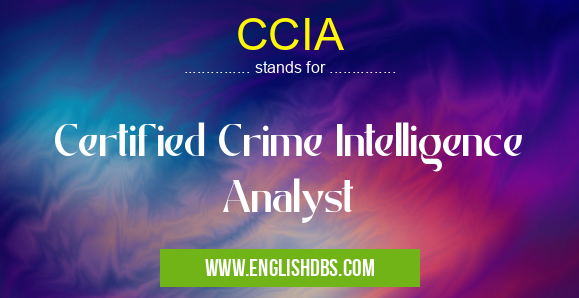What does CCIA mean in POLICE
CCIA stands for Certified Crime Intelligence Analyst, a professional certification created by the International Association of Crime Analysts (IACA). The certification is designed to promote and recognize excellence in the field of crime intelligence analysis. It is intended to provide a benchmark of excellence against which analysts can measure their own performance and academic qualifications. As the IACA puts it, “The goal of the CCIA Program is to improve the accuracy, efficiency, and overall effectiveness of crime intelligence analysis by providing a means through which analysts can assess their skills and knowledge base while building awareness in the analyst community about best practices.”

CCIA meaning in Police in Governmental
CCIA mostly used in an acronym Police in Category Governmental that means Certified Crime Intelligence Analyst
Shorthand: CCIA,
Full Form: Certified Crime Intelligence Analyst
For more information of "Certified Crime Intelligence Analyst", see the section below.
» Governmental » Police
What Does CCIA Mean?
The CCIA credential attests that an analyst has acquired knowledge in core areas related to crime intelligence analysis, such as database management systems, analytical techniques, criminal behavior patterns, statistical evaluation methods, report writing skills and communication strategies. It also certifies that the holder has attained proficiency in practical aspects of intelligence gathering and synthesis. As such, employers will find personnel with this type of experience invaluable when it comes to evaluating potential suspects or developing investigative strategies.
Requirements for Certification
To obtain certification as a Certified Crime Intelligence Analyst (CCIA) one must complete an approved assessment from an accredited provider under the auspices of IACA or another recognized accreditation organization (such as ACFE). This entails successfully completing an approved course on crime intelligence analysis and passing a standardized examination. Additionally, certified candidates must maintain their credentials by completing continuing education requirements within prescribed time frames.
Essential Questions and Answers on Certified Crime Intelligence Analyst in "GOVERNMENTAL»POLICE"
What is a Certified Crime Intelligence Analyst?
A Certified Crime Intelligence Analyst is a professional who uses data to identify and analyze patterns, trends, and relationships in criminal activity. This helps law enforcement agencies develop strategies, tactics, and plans to combat crime. They also assist in developing policy decisions related to crime prevention, intelligence gathering, and law enforcement operations.
What kind of qualifications do I need to become a Certified Crime Intelligence Analyst?
Generally speaking, individuals seeking certification as criminal intelligence analysts must usually be employed full-time or part-time by a criminal justice agency or possess the equivalent experience in the field. Additionally, they will require an applicable Bachelor's degree from an accredited college or university in Criminal Justice, criminology or other related field; relevant work experience; passing scores on the examination; verification of good character; state licensing (when required); completion of continuing education requirements; and adherence to Ethical Standards for Security Professionals.
How do I become a Certified Crime Intelligence Analyst?
To obtain certification as a Crime Intelligence Analyst, you must meet all eligibility requirements set forth by your certifying agency. This typically includes obtaining a Bachelor’s degree in Criminal Justice or another applicable field; possessing relevant work experience; passing the examination given by your certifying agency; providing proof of good character status; being licensed (in some states) ; completing continuing education requirements over time; and adhering to ethical standards for security professionals.
Is there an exam for becoming a Certified Crime Intelligence Analyst?
Yes. Most certifying agencies require candidates to take an exam that measures their knowledge of relevant topics such as criminal profiling, investigative analysis tools, crime mapping techniques and organized crime operations. The exact content of the exam varies depending on the certifying agency so applicants should research their local requirement before attempting the exam.
What subjects would I need to know in order to become certified as a crime intelligence analyst?
In order to receive certification as a crime intelligence analyst you should have knowledge of various topics including statistical analysis methods; criminal justice process/procedures/laws; ethical issues in policing/law enforcement; evidence collection techniques & procedures; investigative analysis methods and techniques (e.g., lead development); information sharing protocols & policies between federal/state/local agencies & international organizations etc., Although this list is not comprehensive it gives you an idea of what topics you will be expected to have knowledge off
Final Words:
In conclusion, for those interested in pursuing careers in law enforcement or related fields involving critical decision-making based on data analysis and strategic thinking, obtaining CCIA certification could prove invaluable. It provides recognition from peers within the profession that you have achieved expertise in your area of expertise. Furthermore, employers largely prefer applicants who have been certified due to their having acquired both technical proficiency and job-related competencies.
CCIA also stands for: |
|
| All stands for CCIA |
